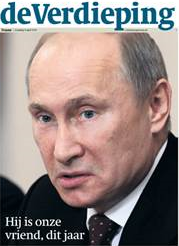Spinoza ontmoet liever Ilyenkov dan Poetin
 Vandaag zal er tijdens het bezoek van Poetin aan Nederland [zgn. vanwege de start van de viering van 400-jaar betrekkingen Rusland-Nederland, maar in werkelijkheid met het oog op gas- en andere handelszaken, cf. NRC] wel geen aandacht voor zijn, daarom wil ik in dit blog even wijzen op de betrekkingen die de Sowjet-marxisten met Spinoza hadden.
Vandaag zal er tijdens het bezoek van Poetin aan Nederland [zgn. vanwege de start van de viering van 400-jaar betrekkingen Rusland-Nederland, maar in werkelijkheid met het oog op gas- en andere handelszaken, cf. NRC] wel geen aandacht voor zijn, daarom wil ik in dit blog even wijzen op de betrekkingen die de Sowjet-marxisten met Spinoza hadden.

Op 18 en 19 mei 2012 werd in Helsinki het symposium "SPINOZA IN SOVIET THOUGHT" gehouden [zie daarover dit blog]. Ik heb daarna nog wel eens proberen te achterhalen of er meer over naar internet werd gebracht, maar ik vond niets, behalve dan dit PDF van het programma. En op de site van prof. Andrey Maidansky zijn powerpointprogramma: "Soviet Spinoza: Faith searching for understanding, presented at «Spinoza in Soviet Thought» Helsinki Symposium, 18-19 May 2012"
Vandaag echter trof ik twee na dat symposium naar internet gebrachte teksten van papers over de belangrijke Sowjet-filosoof Evald Ilyenkov die ik hier graag signaleer [zie over hem dit blog];
• Corinna Lotz & Penny Cole, Spinoza, Ilyenkov & Western Marxism – meeting the challenges of the global crisis [html of PDF]
• Bill
Bowring, What if Ilyenkov Had Known Marx’s Notes on Spinoza? [html vandaar PDF te downloaden]
Uit dat programma:
Spinoza is one of the figures who have played a key
role in the formation of the Soviet Marxism, and even later many thinkers
critical of the official Diamat have repeatedly recurred to Spinozistic
arguments (Vygotskij in psychology, Il’enkov in philosophy, to mention only the
most prominent names). To a part, the importance of Spinozistic ideas came from
the heritage of the discussions in the Second International, during which the representants
of the Left wing such as Mehring and Plekhanov stressed the significance of the
materialistic tradition of Spinoza as a counterweight to the Neo-Kantian
influence in the workers‚ movement. In the Russian Social Democracy, there were
other Spinozainspired theorists, too, for example Anatolij Lunacharskij. In the
early Soviet Union, this strain of thought was continued especially by Abram
Deborin, the most influential Marxist philosopher of the 1920‚s, which later
was criticized to have interpreted Spinoza as a kind of "Marx without a
beard". During the onslaught of Stalinism, the official Diamat was
consolidated in polemics against the Spinozistic tendencies of the 1920‚s, which,
however, never quite disappeared from the orbit of later Soviet philosophy.
Especially in the formation of the so-called
"activity approach" since the 1960’s Spinoza played a role, most
notably in Il’enkov, who in his attempt to renew the Marxist theory of
cognition relied heavily on Spinoza's famous equation of agendi potentia and cogitandi
potentia. Despite the continuous presence -- be it hidden or manifest – of Spinoza
in Soviet thought, there has been very little research on the actual influence
of Spinozistic motifs in Soviet Marxism. Besides casual articles, the only book
on the subject seems to be George Kline's Spinoza in Soviet Thought, published
already in 1952, and even it is, essentially, but a collection of materials
confining itself into the early (pre-Stalinist) phase of Soviet philosophy.
There is an obvious need for a further research." [cf Program]

